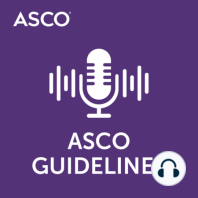15 min listen
Early Detection for Colorectal Cancer Resource-Stratified Guideline
FromASCO Guidelines
ratings:
Length:
11 minutes
Released:
Feb 25, 2019
Format:
Podcast episode
Description
An interview with Dr. Marcia Cruz-Correa from the University of Puerto Rico and MD Anderson Cancer Center on the ASCO Resource Stratified Guideline on early detection for colorectal cancer. The purpose of this podcast is to educate and to inform. This is not a substitute for professional medical care and is not intended for use in the diagnosis or treatment of individual conditions. Guests on this podcast express their own opinions, experience, and conclusions. The mention of any product, service, organization, activity, or therapy should not be construed as an ASCO endorsement. Hello, and welcome to the ASCO Guidelines Podcast series. My name is Shannon McKernin. And today, I'm interviewing Dr. Marcia Cruz-Correa from the University of Puerto Rico and MD Anderson Cancer Center, senior author on "Early Detection for Colorectal Cance: ASCO Resource-Stratified Guideline." Thank you for being here today, Dr. Cruz-Correa. Well, thank you very much for the opportunity to speak with you today. So first, can you give us a general overview of what this guideline covers? Absolutely, Shannon. Well, we are very excited to review the content of the guideline. And we put together a summary of the current guidelines out there for patients that are undergoing colorectal cancer screening. With these particular resource, a certified guideline takes, for the first time, into account the place where the colorectal cancer screening is being delivered, which is different from when you read any other colorectal cancer screening guidelines, where normally we assume that all available methodologies are equally distributed regardless of the country or the setting. So in our particular guideline, we really emphasize the fact that, depending on where our clinicians are, they might have differing technologies available. And that's why it's called resource-stratified-guidelines, to help our clinicians and our practicing physicians to understand what would be the best method to be able to implement screening in their own settings. So what are the key recommendations of this guideline? I think that the most important recommendation is that colorectal cancer is a prevalent disease, not only affecting very highly developed countries, but a disease that we're seeing more and more in low-to-middle-income countries. As ASCO is an organization that has members from around the world, being cognizant of the fact that colorectal cancer affects many individuals across different settings, and countries, and continents, for that matter, allows us to provide the most important information which is to consider colorectal cancer screening across the different settings, so not only in the industrialized well-developed first-world country, but also in the low-to-middle-income, or those that are becoming more and more industrialized. So our main recommendation-- it's number one-- that we need consider colorectal cancer screening even in settings where, for many years, the burden of disease was really focused in infectious-driven diseases. Nowadays, we're seeing more and more low-to-middle-income countries where the number one cause of death, it's not an infectious-driven disease, but rather a cancer. And colorectal cancer, it's one of the top cancers that we're seeing in many of the settings. So our number one recommendation is to be cognizant about that so that different countries and different settings, the practitioners consider screening. And our second and most important recommendation is that, the important thing is to consider what you have available in your setting, in your clinical practice. And depending on what you have available, then you can offer the method that could be given to your patient. So it's almost like thinking differently. It's not a one size fits all, but rather it's more or less of a personalized recommendation based on your setting, based on your clinical practice methods available to you. So why is this guideline so important? And how will
Released:
Feb 25, 2019
Format:
Podcast episode
Titles in the series (100)
Management of Immune-Related Adverse Events Guideline: An interview with Dr. Bryan Schneider of the University of Michigan on the ASCO clinical practice guideline to increase awareness, outline strategies, and offer guidance on the recommended management of immune-related adverse events in patients... by ASCO Guidelines
